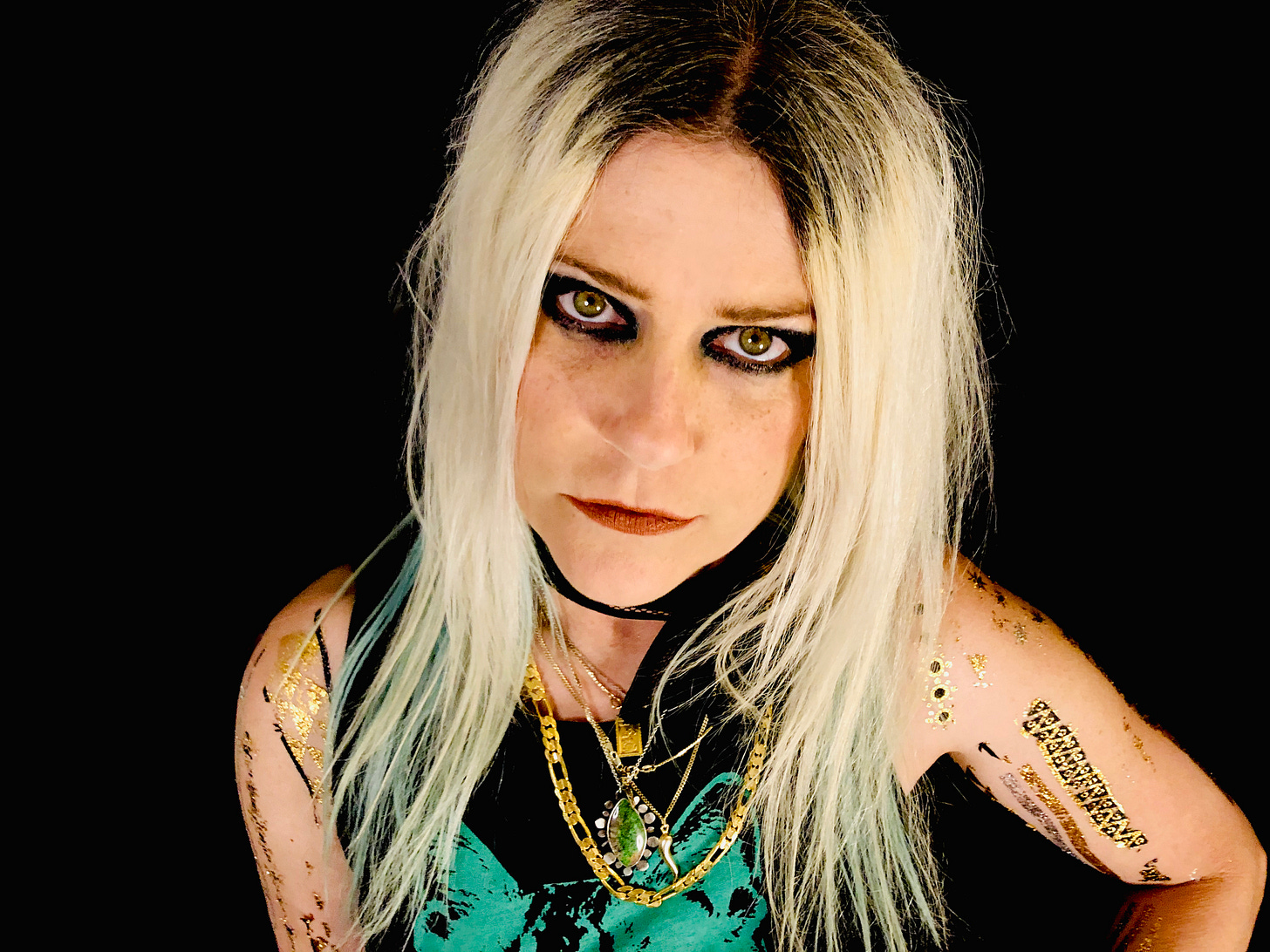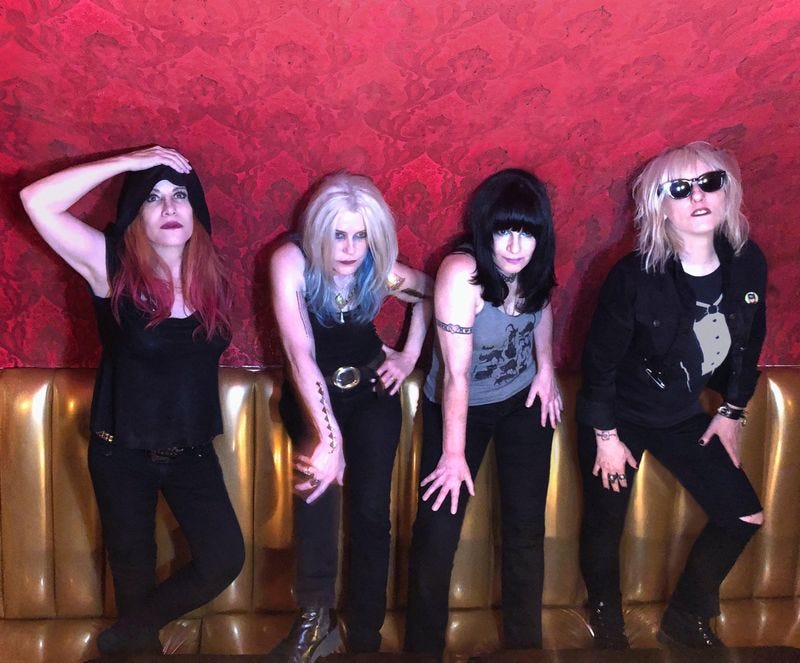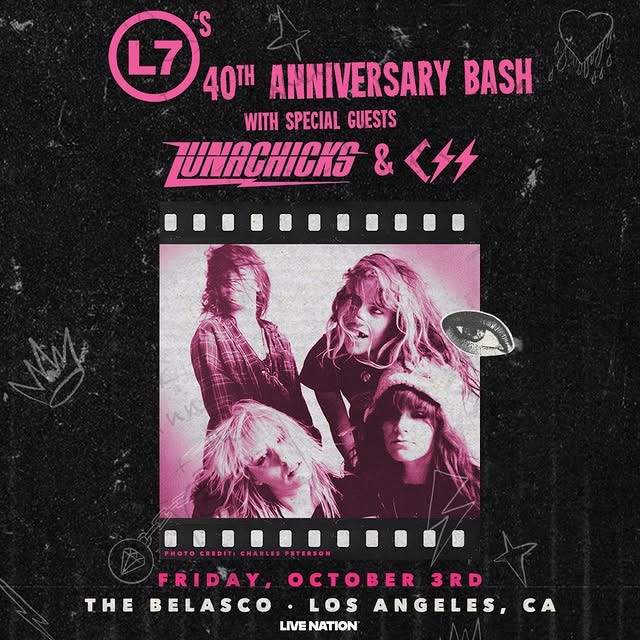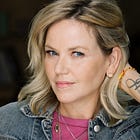CR 060: L7’s Donita Sparks on 40 Years of Music and Mayhem
The legendary frontwoman talks about the 40th anniversary of L7 and her solo work.
Long before Bikini Kill, The Distillers, Hole, or 7 Year Bitch hit the scene, there was L7. Founded in 1985 by frontwoman Donita Sparks and guitarist Suzi Gardner, L7 was a band unlike any other—an all-female lineup playing brackish heavy metal mixed with sneering punk rock and a heaping dose of snarky humor. Though it took a few years for the band to find its footing (not to mention a suitable bassist and drummer), by the late ’80s L7 had a steady lineup and was making its mark on popular culture. The band opened for Nirvana, performed on the main stage of 1994’s Lollapalooza, made a cameo in John Waters’ Serial Mom, and partnered with the Feminist Majority Foundation to launch Rock for Choice, a series of benefit concerts for abortion rights. Both their 1990 release, Smell the Magic, and 1992’s Bricks Are Heavy were included on Rolling Stone’s list of “50 Greatest Grunge Albums,” and their song “Shitlist” served as the soundtrack for a memorable scene in Oliver Stone’s Natural Born Killers.
After a lengthy hiatus from 2001 to 2015, the band reunited, releasing a documentary, L7: Pretend We’re Dead, multiple singles, and a 2019 album, Scatter the Rats. And on October 3rd, the band will have a 40th anniversary celebration in their hometown of Los Angeles. Presented by L7 and curated by Donita Sparks, the “Fast and Frightening Takeover” of L.A.’s Belasco Theater will also feature Lunachicks, a band L7 hasn’t performed with since 1990, and Brazilian rockers CSS. Sparks says she’s looking forward to sharing the stage with both bands, telling me, “I feel a commonness with these bands, because we’ve all got something to say, and we say it all with a sense of humor, too.”
I recently chatted with Sparks about L7’s earliest days, her influences, and what advice she’d give to her younger self.
SANDRA EBEJER: Let’s start off by talking about the “Fast and Frightening Takeover” event at the Belasco Theater. You threw an inaugural event there last year, and of course you’ll be back this year on October 3rd. What inspired you to curate and present the event?
DONITA SPARKS: Well, our agent brought it up years ago to myself and our manager, Robert Fagan, and he thought it would be a really great idea to have an L7-curated festival like so many of the dudes have. He thought we had the amount of gravitas to actually pull something like that off. We didn’t do anything for a while, and then it came up again with this promoter we really like at the Belasco. So that’s how it got going last year. I curated the festival last year, and this year I also curated it, but it is much more pared down this year because it is our 40th anniversary event. We decided to keep it very tight with three great headliners—ourselves, Lunachicks, and CSS—and a couple DJs, and we’ll have an opening band as well.
As you just mentioned, L7 is celebrating its 40th anniversary this year. When you think back on the early days of the band, what comes to mind?
Struggle. You know, Suzi [Gardner] and I started the band, and we spent two-and-a-half years with ever-changing band members on bass and on drums. It was really hard. Guys didn’t want to play with us, even though we were playing hard rock. And there were women playing, but not a whole lot to choose from. There were women in punk bands and there were women in new wave bands, but [not much] as far as what we were doing, which was kind of a stripped-down metal without the wanking solos. We just wanted to play Flintstones rock, which is what we did at first. We developed as songwriters as the years went by. It was a tough time. I look back at it and it was dark until both Jennifer [Finch] and Dee [Plakas] joined the band. We were a rock machine after that.
You’re not like any other band out there. You’ve always done your own thing. Was it difficult for you to build an audience and a following when you were starting out, especially given how slick and corporate most popular music was in the 1980s?
Yeah, it was very difficult to build an audience and a following. But I’ll tell you, Suzi and I were from the art punk scene, and a lot of our art punk friends thought we were really cool, even though we weren’t super cerebral and we weren’t doing high art. Something about us was resonating with the art people, which was really cool because we were unique. That positive feedback kept us going through the hard times. It was that positive reinforcement from those people who are a bit older than us. They thought what we were doing was really cool and fresh.
When did you first begin playing music? Did you know from a young age that you wanted to do this?
Oh, no. I mean, that would have been complete fantasy. Music was around the house when I was growing up. It was prerequisite. You had to take an instrument in school. It’s like how you have to take the foreign language in high school. In the Sparks household, you had to take a music lesson. That’s when public schools had orchestras and bands and stuff like that.
My first instrument was clarinet. I played that for a couple years in grade school. And then I convinced my mother to buy me a shitty electric guitar when I was 16. That’s when I started fucking around, just playing chords and Ramones songs and stuff like that. I didn’t have an amplifier. I just had the shitty guitar, and I brought that with me when I moved out to L.A. I did not think I would be in a band.
What did you aspire to do at that point. Were you more into art?
I was into any art. I was throwing art spaghetti all over the fucking walls. I just wanted to do something in the arts. When I was growing up, I took dance lessons for years, and I really wanted to be a tap dancer. I wanted to be on stage doing musical theater. And that didn’t work out, as I got into my teens and got more and more into rock. I mean, I was always into rock ‘n’ roll, but my lifestyle changed when I got into high school.
When you were starting out as a band, were there any artists that were really influential? Was there anyone whose career you wanted to emulate?
Well, we thought the Butthole Surfers’ career was pretty great, because they were playing big places and they were doing very weird shit. It was like, “Wow, these guys are doing whatever the fuck they want, and people are coming to see them. That’s amazing.” And, of course, we loved the Ramones, but they had trouble getting on the airwaves. They even had a song called “We Want the Air Waves.” So, I knew that those kinds of struggles could happen with a cool band. We really loved Frightwig. We loved Flipper from Frisco. You know, bands with a sense of humor and also with something to say. That’s what all those bands had. They were saying something. Even if at times I didn’t understand what the fuck they were saying, they were saying stuff. That’s what we ended up being.
I came to know your work in the ‘90s. At that time the riot grrrl movement was happening and there were so many female bands and solo artists who were inspiring young women like me to be more politically aware, to embrace feminism, and speak our minds. I’m curious what you’re seeing in the audience today. Are your shows attracting younger listeners? Are they still embracing that feminist, political message?
Oh yeah. We get middle aged people at our shows, and we get young ‘uns at our shows, and a lot of wild young women who are just very brave. I think they’re more powerful today than we were back then. There are more of them embracing feminism and not taking any crap. That is very cool. I also am incredibly proud that we have a large trans following. I’ve watched our fans go from male to female in the time I’ve known them, and from female to male, and it’s just wild. We really resonated with a lot of those people. I think they found strength in our music or the way we presented ourselves. I’m very, very proud of that.
You’ve always been proudly pro-choice. When you think about what we’re dealing with today—it feels like we took a few steps forward and about a thousand steps back—how do you feel? Do you have hope that we’ll reclaim some of the rights we’ve lost?
I think we will, unless we’re all burned at the stake. It’s weird, man. Everybody’s hoping the pendulum is going to swing back. I mean, how can we watch democracy die in the United States? We’re witnessing that right now, and I think everyone, including myself, is afraid. I wish there was more leadership going on with our fucking leaders, you know? What do we do, you guys, other than voting? We need a groundswell of persistent and well-attended protest marches and shit like that. I mean, they can’t send the Marines everywhere. I’m hopeful, but it takes a long time to turn around something that’s been overturned, so I don’t know.
The show on October 3rd has you playing with Lunachicks, a band you haven’t performed with since 1990. And I saw that you recently did some live dates with Garbage. How is it to reconnect and perform with old friends?
Well, the guys in Garbage are old friends. [Garbage frontwoman] Shirley [Manson] is a newer friend. I met Shirley about seven years ago. We never toured back in the day, but we’ve been pals for the last seven years or so. She’s a firecracker! She’s great, and she’s an amazing performer. It was such a joy to watch her from the side of the stage. I had seen her in big venues from the audience, but to actually watch her on the side of the stage, I was just like, “Damn, she’s really good!” I found those shows really moving. I thought their music was excellent—live and up close, in particular.
Lunachicks, those mad women, we haven’t played with in years. Some of them had kids and now their kids are grown up or getting there, and they can do shows again. I’m really glad that they’re doing some shows. They did the majority of their motherly duties, and now they want to rock. So it’s great timing for this 40th anniversary. And I don’t know if you’ve seen CSS, but they’re fantastic. Have you seen CSS?
No, I haven’t.
Oh, man. Check them out. They’re a bunch of art freaks from Brazil. They were on Sub Pop [record label] for a while. They had a song that was an Apple commercial for a while, [sings] “Music is my boyfriend / Music is my girlfriend.” That’s CSS. They’re freaks as well. So it’s gonna be freak flags flying at this show.
L7 had a lengthy hiatus before returning with a new album in 2019. Any chance we’ll get another new album? Are you working on any new music?
I’m working on music. Yeah, we’ll put out a couple songs, either at the end of the year or beginning of next. And then we’re going to do an EP of some of the singles we’ve released over [the years] since the reunion. Some of them were just released digitally, so we’re going to put out some vinyl.
I want to also talk about your solo work because I love the album Transmiticate. It was so different from your work with L7. What was it like to work on, and will you release any more solo music?
Well, thank you for asking. That’s my goal. I have a lot of unfinished stuff, and some of it not appropriate for L7 or just [stuff] I want to do, to just release it for myself. But, yeah, that was an incredibly difficult record to make. I didn’t have a label. I didn’t have anything. I mean, I’m not a person who’s really connected to people. I like that record, but it was difficult. I got started, and then I had to push, push, push to finish it. It was a few years in the making. I’m probably going to release some solo stuff again in the not-so-distant future.
You just mentioned being a fan of CSS. Are there any newer, younger artists out there that you’re really into right now?
I like the Viagra Boys quite a bit. I like Amyl and The Sniffers. I think Amy Taylor is a phenomenal front person, one of the best that’s out there. I like Surfbort, but they’re not really doing anything because she’s pregnant. But I think once she hatches the child, I think she will be back out rocking.
Given that you are celebrating the band’s 40th anniversary, I have to ask: if you could go back to those early days and give yourself advice, what would you say?
I would say, “You’re fucking right, so hold your ground.” I would say, “Sparks, trust your instincts. You’re right. It’s all going to come out in the wash. At the end of the day, you’re going to be left standing. The band will stand.” And that’s what happened.
You know, Suzi and I had to keep giving each other pep talks all the time to keep going. She’d want to quit, and I’d make her stay, and then I’d want to quit, and she’d make me stay. And listen, I was always butting heads with dudes about feminism and shit. When that horrible word feminazi came into the zeitgeist, I was called that many times by a bunch of fucking Rush Limbaugh assholes on the scene. And thank God for riot grrrl, because they made it absolutely unacceptable to fuck with the women in the audience. What they did was really great. We had in-the-trenches training, and they brought the academic training, so all of us together really created a cool time for women in music.
To learn more about L7, find them on Instagram.
To purchase tickets to their 40th anniversary show, click here.
This interview has been edited for clarity and length.
You might also enjoy…







